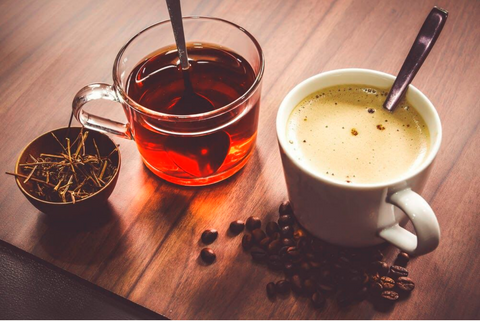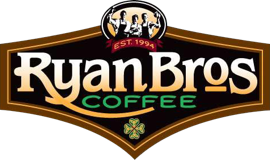

Coffee vs. Tea: Everything You Need to Know about Caffeine
Sep 1, 2020 (Updated on Jul 19, 2023)
In a country with a coffee shop on nearly every corner, it is safe to say that Americans love the effects of caffeine. And with the FDA reporting that approximately 80% of Americans consume caffeine regularly, it seems like the trend is here to stay.
Luckily, today's options are a far cry from the limited black coffee vs. tea discussions of the past. Now, tired workers and parents can choose from more caffeinated beverages than ever. But which drink has the highest caffeine content?
In this comprehensive post, we're here to answer the age-old question regarding caffeine intake. Which has more – coffee or tea?
Caffeine in Coffee
First and foremost, not all coffee beans are not created equally. (And neither are the coffee shops that brew them.) The type of bean, where they were grown and the soil where they grow all play an important role in the bean's caffeine content (and deliciousness).
The amount of caffeine is also impacted by how your beans are roasted, the size of your coffee grinds and the brewing process.
Many people are under the impression that dark roast coffee contains more caffeine because these cups of coffee are bitter. But actually, dark roast coffee options undergo a longer and more intense roasting process. And while these long roasting times produces a bold flavor, the extended heat exposure also results in a loss of caffeine. So if caffeine is what you seek, then a lighter roast coffee option is the choice for you.
Also, generally speaking, smaller grind sizes and hot water will extract more caffeine than larger grinds and cold water. However, our artisans have developed innovative processes to craft delicious, highly caffeinated cold drinks.
Here is a breakdown of the caffeine content in common coffee orders:
Drip Coffee: Our drip coffees are laden with flavor...and caffeine. If you are looking for a simple cup of coffee, you can expect to consume about 80 mg of caffeine.
Espresso: A 1 oz espresso shot contains about 60 milligrams of caffeine. From there, your possibilities are pretty endless. Combine espresso shots with steamed milk for a latte. Or, use steamed milk froth and enjoy a cappuccino. And in any of these drinks, you get to customize the number of shots.
Our customers love espressos so much that we recently launched our Freestyle Xpresso bar, where you can customize your drink entirely to your liking.
Cold Brew: Because coffee beans bypass the roasting process in cold brews, you can expect higher caffeine levels even though cold water is used. So, an 8 oz cup of cold brew coffee contains about 100 mg of caffeine. But with our cold brew on tap, who stops at 8 ounces.
Caffeine in Tea
Next, let's explore some tea options. In addition to enjoying some caffeine, tea drinkers enjoy the many other health benefits that come from steeping flavorful tea leaves and herbs.
There are four major categories of caffeinated tea: black tea, green tea, white tea and oolong tea. Here is a breakdown of each type of tea and its corresponding caffeine levels.
Black Tea: When it comes to caffeine, you will get the most from drinking a cup of black tea, such as earl grey, chai or a good breakfast blend. It even ranks higher than green tea, thanks to longer infusion time and higher steeping temperatures. You can expect to find 60-90 mg of caffeine with each 8-ounce cup.
Green Tea: A cup of green tea contains between 30-50 milligrams of caffeine. Although green tea drinkers experience a number of health benefits spanning from low blood pressure and weight loss to increased heart and brain health. And if you love the idea of green tea but just haven't found one that fits your palette, you will be happy to know that you have options.
Oolong Tea: Oolong teas also contain caffeine, although not as much as the green and black tea counterparts. With 50-75 mg of caffeine per 8 oz, these teas are great for tea drinkers that prefer light, fruity flavors.
White Tea: While white tea can contribute to a slight energy boost, there is less caffeine in this tea variety. With the same light, refreshing vibe that comes from oolong, white teas are a great option for those who shy away from bold flavors. And with 30-55 mg of caffeine per 8 ounces, white tea can still help give you a slight boost.
Herbal tea: Herbal tea does not contain any caffeine. So it won't help you bust through the mid-day slumps. But don't write it off just yet. Good herbal tea can combat stress, sore throats and help lull you into a good night’s sleep after a day of hustling.
Other Caffeine Sources:
Yerba Mate is in a category all of its own. Unlike coffee, which is harvested from coffee beans or tea, which comes from tea leaves, yerba mate comes from a caffeinated species of tree in the South American rainforest. It has around 80 mg of caffeine per cup, thus positioned somewhere between coffee and tea.
Unfortunately, many contradictory claims have been made about the health benefits of this drink. While some say that Yerba Mate comes with antioxidants and builds up heart health, others have cited the development of cancer in people who drink Yerba Mate regularly over prolonged periods. And that is just not a risk we're willing to take.
Similarly, while energy drinks are readily available for many, their nasty side effects and lengthy ingredients that no one can pronounce makes them a no-go in our book.
Final Verdict

While the caffeine levels in coffee and tea vary depending on the type and preparation, a good rule of thumb is that 2 cups of tea contains about the same amount of caffeine as 1 cup of coffee.
Although unsurprisingly, increasing the number of cups you drink increases your caffeine intake. So if you find yourself sipping on some tea throughout the day, you might find that you enjoy more caffeine from tea than you would from drinking a single luxury coffee in the morning.
And while everyone seems to be jumping on the energy drink and Yerba Mate bandwagon, the risk of cancer from long-term usage is enough to deter us.
So we'll stick to the same artisan coffee and tea that we're used to.
Check out our latest flavors.





